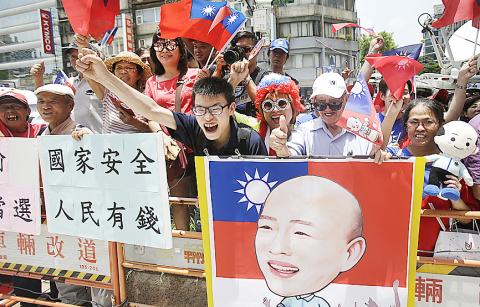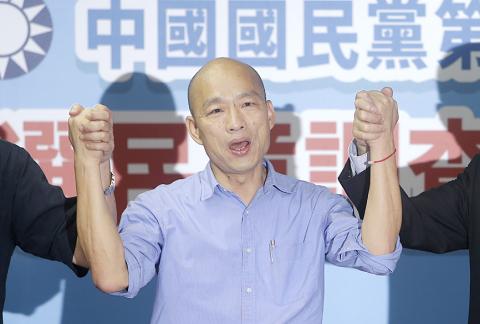The Chinese Nationalist Party (KMT) is to nominate Kaohsiung Mayor Han Kuo-yu (韓國瑜) as its candidate for next year’s presidential election after he beat Hon Hai Precision Industry Co (鴻海精密) founder Terry Gou (郭台銘) by 17 percentage points in the primary.
Han received an aggregated support rate of 44.805 percent in the polling, conducted from July 8 to Sunday, KMT Vice Chairman Tseng Yung-chuan (曾永權) said yesterday at KMT headquarters in Taipei.
Gou received an aggregated 27.73 percent support, while former New Taipei City mayor Eric Chu’s (朱立倫) total was 17.9 percent, former Taipei County commissioner Chou Hsi-wei (周錫瑋) got 6.02 percent and Sun Yat-sen School president Chang Ya-chung (張亞中) 3.544 percent, Tseng said.

Photo: Chiang Ying-ying, AP
Poll data released by the KMT showed that Han’s support ratings were the highest when matched with fellow KMT members and with outside competitors.
When respondents were asked who of the five candidates they would vote for for president, more than 51 percent chose Han, while about 34 percent chose Gou and 13 percent chose Chu, the poll found.
Asked to choose between Han, President Tsai Ing-wen (蔡英文) and Taipei Mayor Ko Wen-je (柯文哲), 47.7 percent said they would back Han, 18 percent said Ko and 15.8 percent Tsai, it found.

Photo: Chiang Ying-ying, AP
Asked to choose between Gou, Tsai and Ko, 29.2 percent said Gou, 14.6 percent said Ko and 14.1 percent said Tsai, it found.
Asked to choose between Chu, Tsai and Ko, 20.7 percent said Chu, 18.8 percent said Ko and 15.6 percent said Tsai, it showed.
The poll was conducted by five polling companies and gathered a total of 15,185 valid samples via landlines, the KMT said.
At a news conference at KMT headquarters after the results were announced, Han thanked the party, his fellow candidates and his supporters.
“At this moment I feel no joy in my heart, only great pressure, given the huge challenges ahead,” he said. “With your help, I hope to take up the responsibility and work to create a better future for Taiwan, to safeguard the Republic of China — and to carve out a brighter and more fecund path for our future generations.”
He would review the policies proposed by the other candidates and adopt viable ones, but to ensure party unity, he planned to immediately contact his rivals and arrange visits with them, he said.
While the KMT has been discussing the removal of a clause in its charter requiring a member elected president to double as the party’s chairman, Han said he would “completely respect” the Central Standing Committee’s decision.
Asked if he would step down as mayor to prepare for the presidential campaign, Han said he would do his best to run the city.
“Please rest assured that I would not dare forget my responsibilities as mayor of Kaohsiung,” he said.
Asked about rumors that the Democratic Progressive Party had urged its supporters to back Han in the KMT poll, believing he would be easier to beat, the mayor said it is normal for parties to mobilize their supporters during primary polling.
“The KMT’s presidential primaries have never been unfair,” KMT Chairman Wu Den-yih (吳敦義) said, adding that this primary was the most transparent the party has ever held.
Han is to be formally nominated at the KMT’s national convention on July 28 after the Central Standing Committee reviews his nomination tomorrow.

CHAOS: Iranians took to the streets playing celebratory music after reports of Khamenei’s death on Saturday, while mourners also gathered in Tehran yesterday Iranian Supreme Leader Ayatollah Ali Khamenei was killed in a major attack on Iran launched by Israel and the US, throwing the future of the Islamic republic into doubt and raising the risk of regional instability. Iranian state television and the state-run IRNA news agency announced the 86-year-old’s death early yesterday. US President Donald Trump said it gave Iranians their “greatest chance” to “take back” their country. The announcements came after a joint US and Israeli aerial bombardment that targeted Iranian military and governmental sites. Trump said the “heavy and pinpoint bombing” would continue through the week or as long

TRUST: The KMT said it respected the US’ timing and considerations, and hoped it would continue to honor its commitments to helping Taiwan bolster its defenses and deterrence US President Donald Trump is delaying a multibillion-dollar arms sale to Taiwan to ensure his visit to Beijing is successful, a New York Times report said. The weapons sales package has stalled in the US Department of State, the report said, citing US officials it did not identify. The White House has told agencies not to push forward ahead of Trump’s meeting with Chinese President Xi Jinping (習近平), it said. The two last month held a phone call to discuss trade and geopolitical flashpoints ahead of the summit. Xi raised the Taiwan issue and urged the US to handle arms sales to

State-run CPC Corp, Taiwan (CPC, 台灣中油) yesterday said that it had confirmed on Saturday night with its liquefied natural gas (LNG) and crude oil suppliers that shipments are proceeding as scheduled and that domestic supplies remain unaffected. The CPC yesterday announced the gasoline and diesel prices will rise by NT$0.2 and NT$0.4 per liter, respectively, starting Monday, citing Middle East tensions and blizzards in the eastern United States. CPC also iterated it has been reducing the proportion of crude oil imports from the Middle East and diversifying its supply sources in the past few years in response to geopolitical risks, expanding

An Emirates flight from Dubai arrived at Taiwan Taoyuan International Airport yesterday afternoon, the first service of the airline since the US and Israel launched strikes against Iran on Saturday. Flight EK366 took off from the United Arab Emirates (UAE) at 3:51am yesterday and landed at 4:02pm before taxiing to the airport’s D6 gate at Terminal 2 at 4:08pm, data from the airport and FlightAware, a global flight tracking site, showed. Of the 501 passengers on the flight, 275 were Taiwanese, including 96 group tour travelers, the data showed. Tourism Administration Deputy Director-General Huang He-ting (黃荷婷) greeted Taiwanese passengers at the airport and